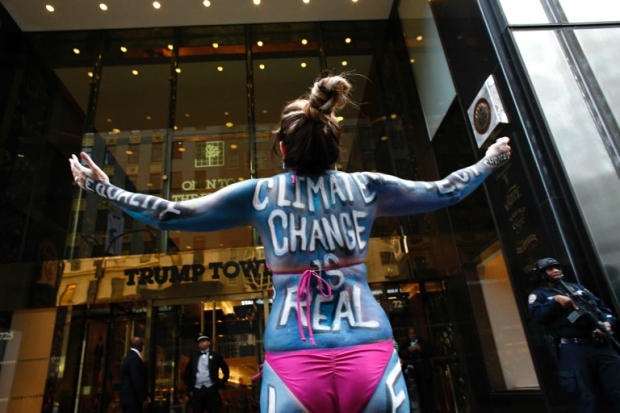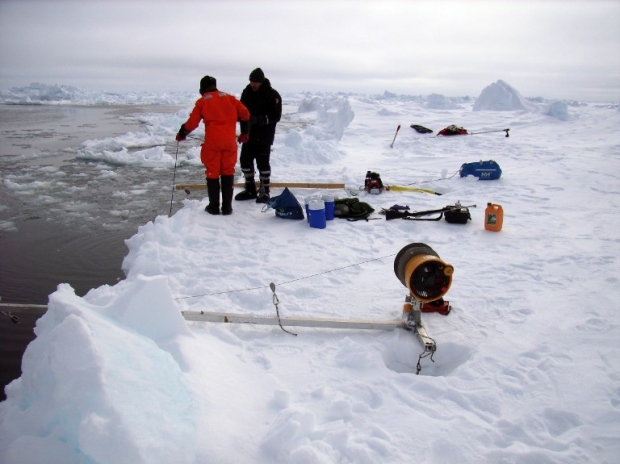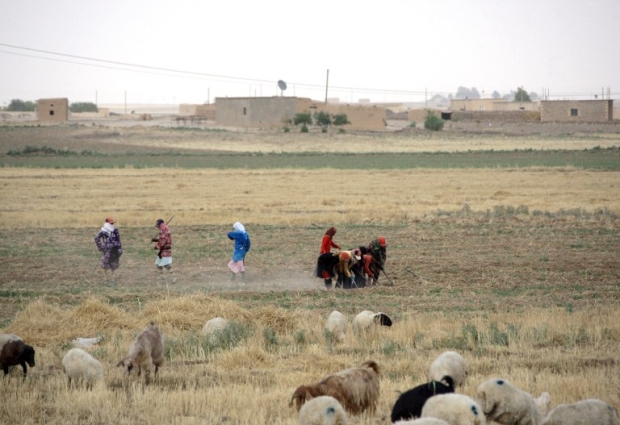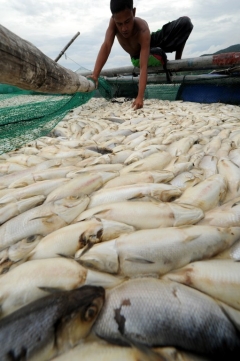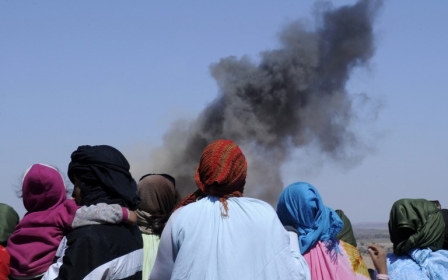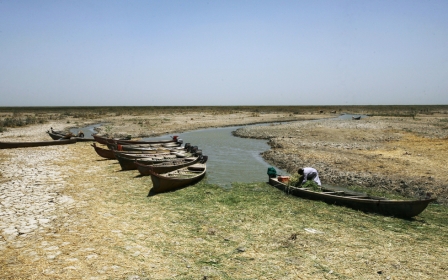Climate change: How Trump could become the world's greatest sponsor of terrorism
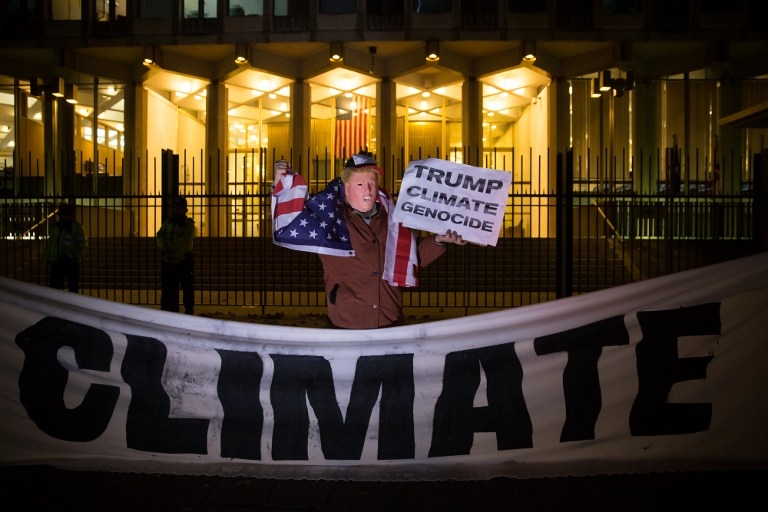
In his 2002 "letter to the American people", Osama Bin Laden outlined his justifications for the September 11th attacks.
While US military bases in Saudi Arabia, crippling sanctions against the Iraqi people, and Israel’s illegal occupation of Palestinian land were the issues that occupied media headlines, it was the al-Qaeda leader’s surprising criticism of US environmental policy that went largely ignored.
If Trump fulfils his promise not to cut US carbon emissions, things are about to become worse. Much, much worse. And by worse, I mean increasingly violent. Everywhere
“You have destroyed nature with your industrial waste and gases more than any other nation in history. Despite this, you refuse to sign the Kyoto agreement so that you can secure the profit of your greedy companies and industries,” wrote Bin Laden.
Wait, Bin Laden the Salafist-jihadist environmentalist? It would seem so.
He continued: “The life of all mankind is in danger because of the global warming, which is largely due to emissions of the factories of the major companies; nonetheless, the representatives of those companies in the White House insist on not observing the Kyoto Accord, notwithstanding…the death and displacement of millions of people as a result.”
Bin Laden’s warning is so uncontroversial that it reads almost identically to the Pentagon’s very own assessment of security implications of climate change-related threats and risks, which describe climate change as a “threat multiplier” that will exacerbate terrorism.
It's happening now
So, it’s as this juncture we run head first into an orange toned, triple-chinned, megalomaniac problem: Trump wants to fight terrorism while at the same time bringing an end to the United States’ commitment to combat climate change.
Let’s be very clear: climate change is no longer a prediction or a forecast. It’s a now-cast
Not only has Trump defied irrefutable evidence and climate science consensus by falsely arguing climate change to be a “Chinese hoax”. He has also promised to withdraw the US from the “ground breaking” 2015 Paris Agreement – a global pledge signed by 200 countries to cut climate change causing greenhouse gases for the purpose of staving off the coming global environmental calamity.
READ: The orange-hued authoritarian haunting my dreams
Let’s be very clear: climate change is no longer a prediction or a forecast. It’s a now-cast. Climate change is happening now, and its impact is sowing anarchy and chaos the world over. From this social chaos comes violent, transnational, non-state actors – many who exist now; many who will emerge later; all of whom will come to threaten the very notion of the nation-state itself.
Predictions become reality
For decades, climate scientists have warned us of the coming climate-change-fuelled apocalypse. Nearly every prediction made 30 years ago is upon us now: the earth’s temperature is rising, Arctic ice is melting, storms are intensifying, the equator is becoming wetter, and everything between 30-60 degrees north and south of the equator is becoming drier.
In 1994, Robert Kaplan, a geopolitical analyst, published the widely read and highly controversial The Coming Anarchy” which warned how “scarcity, crime, overpopulation, tribalism, and disease are rapidly destroying the social fabric of our planet,” and moreover, how the impacts of climate change promise to apply a blowtorch to each of these “wicked problems".
READ: The impact of war on Syrian water is so vast, you can see it from space
Read that last paragraph again because that’s exactly where we are today, exactly where Kaplan said we would be nearly a quarter-century ago. To Kaplan’s last point, a recent op-ed in The Atlantic identified Donald Trump as the “first demagogue of the Anthropocene,” arguing he “represents a white racial backlash…insofar as his supporters are drawn to him by a sense of global calamity, and insofar as his rhetoric singles out refugees as yet another black and brown intruder trying to violate the nation’s cherished borders".
Unfortunately, if Trump fulfils his promise not to cut US carbon emissions, things are about to become worse. Much, much worse. And by worse, I mean increasingly violent. Everywhere.
Climate-related calamities
In 2012, a team at the University of Hamburg looked at 27 empirical studies that had investigated the link between armed conflicts and climate change. Sixteen out of the 27 found "a significant link between climate and conflict, six did not find a link, and five found an ambiguous relationship," the lead researcher told The Atlantic. But the data, he said, was not conclusive.
But other studies have found otherwise, including one major study out of the Potsdam Institute for Climate Impact Research. Looking at more than 30 years of data on climate-related events, the Potsdam researchers found that “nearly a quarter of all ethnic-fuelled armed conflict coincided with a climate-related calamity" - but only in countries with pre-existing ethnic divisions.
READ: COP22 in Morocco: Between greenwashing and environmental injustice
Researchers have also demonstrated that climate change had a causal relationship with the Syrian civil war. In the years leading up to the outbreak of violence, Syria was likely experiencing its worse drought in 900 years, forcing 1.3 million Syrian farmers from their land, into the cities.
President Assad was unable - or unwilling - to mitigate or manage these political tensions, seeing them as a threat to his dictatorship. So rather than seek social solutions to growing civil discontent, Assad chose to fire weapons upon his own people – in an effort to quell protests against his regime.
'Convincing climate fingerprint'
Weak and failing states the world over are vulnerable to the exact experience inflicted upon the Syrian people. When states are unable or incapable of responding to natural disasters; when peripheries of the state are beyond the reach of central governments, violent non-state actors emerge to fill the space.
“It’s a pretty convincing climate fingerprint,” retired Navy Rear Admiral David Titley, a meteorologist who is now a professor at Penn State University, told Slate. “It’s not to say you could predict ISIS out of that, but you just set everything up for something really bad to happen…you can draw a very credible climate connection to this disaster we call ISIS right now.”
In turn, impoverished fishermen are turning increasingly to sea piracy to supplement their incomes. Of more concern is the fact existing terrorist groups located in regions that are already feeling the impacts of climate change are already engaging in sea piracy to fund their terrorist activities. In the future, we will see more sea pirates turning to terrorist or militant activities - in much the same way Abu Sayyaf, the sea piracy group cum terrorist group in the southern Philippines, has made that transformation.
'Mere survival'
In 1994, Kaplan predicted the future will be an “ever-mutating representation of chaos” one that would be governed less by “centres” of power, and more by a constellation of transnational terrorist groups, drug cartels, mafias, and private security companies. In the future, politics will matter less, personal security will matter more, and that “future wars will be those of communal survival, aggravated or, in many cases, caused by environmental scarcity,” forewarned Kaplan.
It is impossible to prosecute a war against violent extremism, while ignoring the causal mechanisms that underpin violent extremist actors
More recently, former US secretary of state John Kerry gave added emphasis to Kaplan’s warning when he remarked, “You think migration is a challenge in Europe today because extremism, wait until you see what happens where there’s an absence of water, an absence of food or one tribe fighting against another for mere survival.”
Others have predicted that these undercurrents and climatic trends have the potential to bring down large-scale states such as India and Pakistan.
“Given that in 2025 India’s population could be close to 1.5 billion, that much of its economy rests on a shrinking natural resource base, including dramatically declining water levels, and that communal violence and urbanization are spiraling upward, it is difficult to imagine that the Indian state will survive the next century…Pakistan’s problem is more basic still: like much of Africa, the country makes no geographic or demographic sense…with as much as 65 percent of its land dependent on intensive irrigation, with wide-scale deforestation, and with a yearly population growth of 2.7 percent, Pakistan is becoming a more and more desperate place,” writes Kaplan.
As one can see, it is impossible to prosecute a war against violent extremism, while ignoring the causal mechanisms that underpin violent extremist actors. Climate change remains a dominant contributor to global violence and conflict today. It will remain so in the future.
The United States is the world’s greatest producer of carbon emissions. Should Trump break his country’s promise to cut greenhouse gases, he will go down as the world’s greatest single sponsor of global terrorism.
- CJ Werleman is the author of Crucifying America, God Hates You. Hate Him Back, Koran Curious, and is the host of Foreign Object. Follow him on twitter: @cjwerleman
The views expressed in this article belong to the author and do not necessarily reflect the editorial policy of Middle East Eye.
Image: A man wearing a mask portraying US President Donald Trump poses with a sign during a demonstration against Trump's vow to withdraw the US from the Paris Climate Accord, outside the US Embassy in central London in 18 November 2016 (AFP)
This article is available in French on Middle East Eye French edition.
Middle East Eye propose une couverture et une analyse indépendantes et incomparables du Moyen-Orient, de l’Afrique du Nord et d’autres régions du monde. Pour en savoir plus sur la reprise de ce contenu et les frais qui s’appliquent, veuillez remplir ce formulaire [en anglais]. Pour en savoir plus sur MEE, cliquez ici [en anglais].



